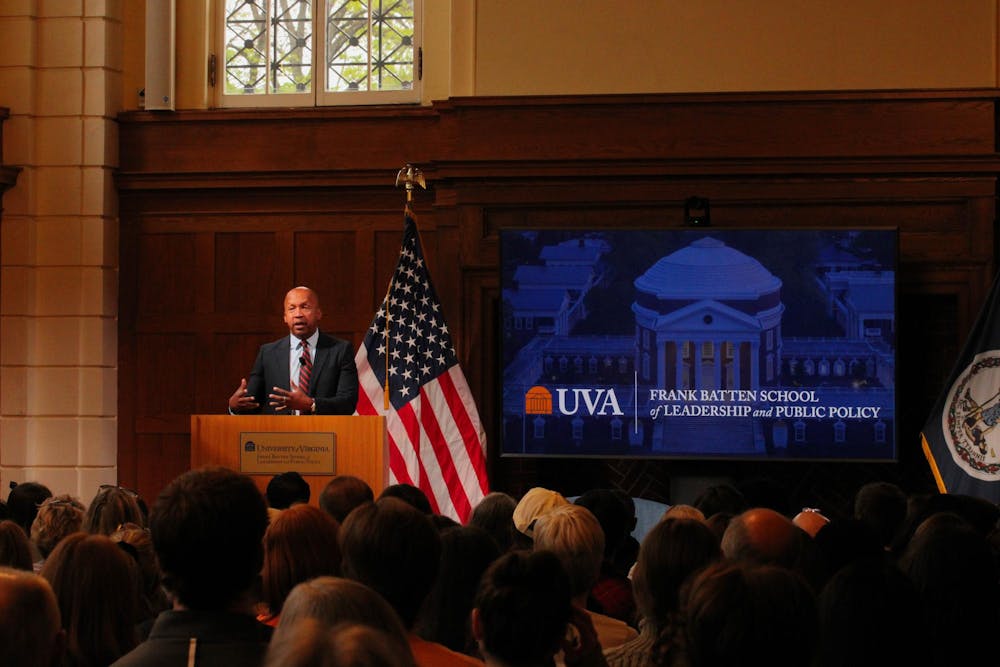Prominent civil rights attorney Bryan Stevenson delivered a speech Thursday afternoon at the Frank Batten School of Leadership and Public Policy, focusing on the intersections of racial justice, public policy and moral leadership. Stevenson discussed the ways his legal career and personal experiences impacted his life’s work, while alsonoting the importance of community and resilience.
Batten School Dean Ian Solomon introduced Stevenson who has earned him numerous accolades, including the MacArthur Fellowship, the National Humanities Medal and most recently, the Thomas Jefferson Medal in Citizen Leadership awarded to him by the University and the Thomas Jefferson Foundation this year.
Throughout the event, Stevenson shared several of his opinions and key themes of his work and answered questions from audience members.
Stevenson emphasized the concept of proximity in leadership — the idea that public leaders and advocates must be close to the communities they serve in order to fully understand their experiences and needs. He said this is particularly important in cases involving the death penalty and the criminally accused, where physical and emotional distance often leads to dehumanization and injustice.This approach, according to Stevenson, is necessary to craft policies that are both equitable and effective.
“I think effective leadership requires a commitment to proximity, and I say commitment because in our country it's very easy to separate yourself from the problems of the poor, the problems of the neglected, the problems of the incarcerated,” Stevenson said. “You can just move away, you can just shield yourself.”
Stevenson continued to focus on the narratives that shape public policy, arguing that the ones grounded in fear and anger have historically justified racial oppression. He also said they continue to influence contemporary issues such as mass incarceration, discussing the U.S.’s high incarceration rate.
“They started saying that people who are drug addicted are criminals and they should be punished … We’ve extended the laws of punishment and hundreds of thousands of people were sent to jails and that's been the biggest driver of mass incarceration in America,” Stevenson said.
Drawing connections to historical atrocities like the Holocaust and the Rwandan genocide, Stevenson noted how dangerous narratives can escalate into violence when left unchecked. He argued that the same dynamics are present in the American criminal justice system, which he says disproportionately punishes children, especially those of color and from low-income backgrounds.
Stevenson also spoke about the role of education in helping people understand and respond to social and historical issues. He highlighted ongoing national debates about how race and history are taught in schools and emphasized the responsibility of public institutions, like colleges and universities, to promote open and thoughtful discussions. He noted that diversity, equity and inclusion efforts play a key role in shaping these conversations and ensuring that all voices are heard.
Mentioning the importance of DEI initiatives within private companies and corporations, Stevenson talked about the ways these initiatives and people’s opinion of DEI have changed over time.
“But the narrative became a narrative of … we don't know that those people are qualified, we don't know that those people deserve it,” Stevenson said. “Other people aren't getting jobs they used to get even when they aren’t most qualified, and that became the source of this narrative that DEI is bad.”
Stevenson argued that ideas expressing skepticism about the qualifications or merit of individuals benefiting from DEI have contributed to a broader backlash against these efforts, backlash which he said is often shaped by feelings of uncertainty and resentment.
Shifting from this critique, he turned to another core component of his talk, the importance of community and moral resilience. He talked about where power comes from and how communities that have faced injustice can still push for change, even in challenging times.
“I've been surrounded by generations of people who have struggled to create the opportunities that I now have, who have put me on this stage, put me in this space, and so I think that has to be part of what we tap into,” Stevenson said. “We begin to sense our power isn’t economic, it's not political, it's not military, but it's still powerful … It's moral.”
While Stevenson did not offer prescriptive policy solutions, he emphasized the importance of sustained engagement, historical understanding and moral clarity in confronting the challenges of inequality.
Stevenson has argued numerous cases before the U.S. Supreme Court, represented clients on death row and advocated for criminal justice reform. In addition to his legal work, he is the founder of three public institutions that confront racial violence and justice, the National Memorial for Peace and Justice, Freedom Monument State Park and the Legacy Museum.







